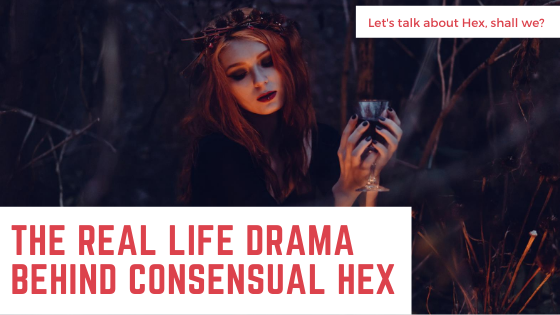We have a massive problem here. Consensual Hex had an issue right from the start with its blurb stating it was “The Craft for the #MeToo era”. Yikes. So much yikes. Those 6 words were enough to turn me off the book, but that’s just skimming the surface of the massive amount of problems this book has. Let’s not be coy and just jump right to the crux of the issue.
A witch is raped by a frat boy at the start of the book. Our main character, Lee, is understandably upset. Her rape leads her to create a coven and fight rapists on campus. At the same time, the power threatens to go to her head. The witch desperately wants to get revenge for her rape.
We’re already off to a terrible start and I haven’t even started on the real life drama surrounding this book. Without further ado, let’s get into it.

Consensual Hex Stole Characterization and Trauma Details from Real People
Consensual Hex lifted entire sections of its story and characters from real life people. Aside from changing the names and setting itself in a magical world, multiple people have accused Amanda Harlowe of stealing their personal information and trauma for this book.
She took the details that her former friends told her in confidence and did a bare minimum fanfiction name swap. This is Fifty Shades of Grey, but with outright rape and based on real people. It’s disgusting and the fact that the publisher isn’t cracking down more harshly on this is disgusting as well. You only need to look at the most popular reviews on Goodreads to get a sense of how much Amanda Harlowe lifted from real life to craft her book.
Amanda Becomes Lee “an outstanding, magical anti-heroine”
Let’s take a second to talk about self-inserts.
For those who don’t know, a self-insert is a character that is the author. It’s not in a clever fourth wall-breaking way. Just the author wanting to be the hero of the story and sneaking their way in there. Powerful and strong, Lee is an “anti-heroine”, but we’re also meant to empathize with her.
Yes, a bad things happen to Lee, but that doesn’t detract from how Harlowe portrays herself in the book. Lee is the center of her friend group, she’s exceptional enough to be invited to an exclusive class. On top of that, the blurb describes her with breathless, glowing praise. Lee is called a character that “demands our attention, clawing out from every page”.
Being called vicious or caustic don’t take away from this, not from a character that’s an anti-heroine. Keep in mind as well that this is Harlowe’s story. She had a choice in how she portrayed herself. All the other people I’m about to mention, did not.
Sunny Becomes Luna “an alluring Brooklyn hipster”
Goodreads user Sunny has come forward and stated:
Many details of this character are ripped straight out of my life, including information about my family, aspects of my appearance, details of my sex life, what I studied in college, the sport I played as a teenager, and even the full unchanged name of where I went to high school. I cannot describe how invasive and violating it feels to have private information about myself, shared with a friend in confidence, now published for strangers to see.
Harlowe didn’t just stop with detailing the sex lives of her former friends. She describes Luna’s vagina as feeling like “like expired play dough” and lusts after her. I can only imagine how uncomfortable this would be to read knowing that this character is based on you.
Ash Becomes Charlotte “a waifish, chill international student”
Ash also made a Goodreads account to comment on the book and not only corroborated Sunny’s account, but expanded on it.
I can now confirm that the character Charlotte is not only based on me, but (in its current iteration) includes an immense amount of identifiable personal information about me, including shockingly specific details of my medical history, the name of the hospital I was born in, the house I lived in at Smith, the name of my hometown, details of my sex life, my preference in menstrual products, and much more. Very few details are changed, and those that are serve either to paint a more unflattering caricature, or as an attempt to score diversity points (I am white, Charlotte is Korean).
Harlowe is doing more than just stealing people’s stories, she’s a phone number away from full on doxing them.
In her review, Ash says that they’re glad that Charlotte is so unimportant to the story. Compared to the other two, she feels she got off easy. This still doesn’t take away from it being a massive invasion of privacy.
Izzy Becomes Gabi “who has a laundry list of phobias”
Perhaps the worst treatment in the novel goes to Gabi. A lesbian whose gender presentation is more masculine, they’re treated with contempt.
i was friends with amanda harlowe in our first year of college at smith. we had some interpersonal conflict, lost contact, and, 7 years later, i found that i was blatantly ripped off as the villain of amanda’s new novel.
Harlowe is quick to make a few things Gabi’s defining traits. One is an anti-semetic mention of their long nose (Gabi is based on a Jewish woman). The other? That Gabi is “essentially a frat bro with breasts” as Izzy describes her treatment.
Gabi isn’t just a villain, but a comically evil one who is assaulted with a sex toy at the end. We’re supposed to think that she deserved that treatment. The main character who we’re meant to be identifying with blackmails Gabi into not saying anything. In this supposedly feminist text, Harlowe’s self-insert uses the tactics of abusive male rapists to silence a female that she’s assaulted.
Consensual Hex, A Book About Rape Politics and Consent, Exploited Women Without Their Consent
The politics on this are flimsy at best. Think Joss Whedon in the 90s going yay, feminism. But with worse writing. And somehow a worse grasp on the implications of what they’re writing. Many reviewers who were not part of this real life friend group claimed to be confused with what Harlowe was trying to get across. Was sexual assault good? Bad? Is it okay if the person “deserves” it?
The huge irony here is that this is supposed to be a book about consent. Any book centered on rape is a book about consent. That’s not debatable.
But Amanda Harlowe threw consent out the window and exposed intimate details of her former friends lives. She sexualized and brutalized them in her book, all without even the common courtesy of letting them know. Monetizing the trauma of your former friends is beyond low.
In Consensual Hex, Amanda Harlowe is Trying to Sell Us Her Revenge Porn
As I mentioned earlier, there is a scene near the end of the book where Harlowe’s self-insert character attacks Gabi with a vibrator. The scene is disturbing enough on its own, calling back to an earlier sexual assault. Bathrooms do not feel safe in this universe. We’re meant to know this. So, it becomes even more disturbing when you realize that this is a real person’s avatar being hurt like this in the book.
I read further into Ash’s review on Consensual Hex and realized that Harlowe really did have these kind of thoughts toward her friend. According to Ash, Harlowe “once confided in a mutual friend about the violent urges she held towards the person on whom Gabi is based.”
I could talk about how the queer on queer violence is deplorable or the terrible message about assault that the book sends. But that almost doesn’t matter when you realize the truth.
Basically?
We are reading someone’s twisted revenge fantasy against a real life person.
In the End, Does it Even Matter?
Forgive the poor Linkin Park reference, but yes! Yes, it does. As things currently stand, the publisher is as much to blame as Harlowe. The real life people parodied in Consensual Hex still don’t know how much of their personal information will be in the book once it’s published.
According to Sunny, they “eventually heard back from a representative at Hachette that Harlowe had agreed to “make some changes.” However, they will not tell us what those changes are, so I have no way of knowing if private or identifiable information about me will make it into the final draft.“
This is not good enough. The book should never be published and Amanda Harlowe should be blacklisted, at least until she’s able to write a proper book without using real life people. I get drawing inspiration from what you know, but this is too much.
Hatchette books should be seriously taking a look at their business ties with Harlowe to see if this poorly written book is worth it.
And for us? The ones who don’t run publishing companies? Use the platforms that you have to call out the book, especially around the time of its release. Don’t give the book your money either. It’s not worth it on any level.
Besides, if you’re looking for supernatural, witchy stories, there are better books to give your money.
Do you have any suggestions or are there things you think I’ve missed? Leave a comment below. Or if you want more posts like this? Sign up today and never miss a post!


Thank you for spreading the word about this bullshit surrounding Consenual Hex!